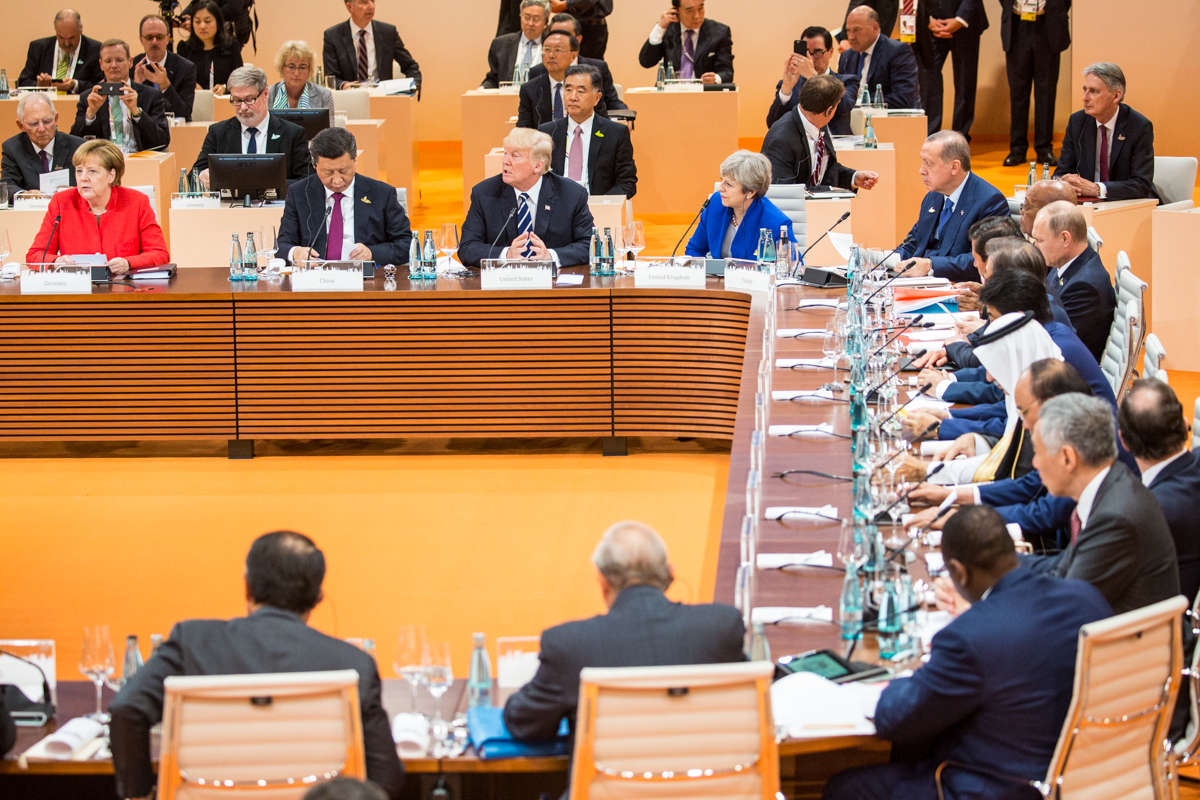By Andrew Kydd
Occasionally an Iranian journalist sends me an email asking my opinion on various foreign policy issues facing Iran and the United States. I assume that journalists in Iran, particularly those at Fars New Agency, are agents of the state, so I look on this as pro-bono consulting work for the Iranian government. And since “occasionally” is more than once — which is how many times the US government has sought my input — I am naturally flattered and do my best to respond promptly. Usually these responses disappear into the void, but since a new request comes along after a few months to a year, it seems like I am at least still on someone’s list.
Recently, I got a request from Kourosh Ziabari from the Iran Review for a more structured interview. He even called me up long distance from Teheran, making me feel even more important. I was therefore excited to answer his questions. When I got them via email, I was not disappointed. Ziabari’s questions were familiar, presuming US decline and seeking affirmation and explanations for that welcome trend. So I happily sent in my responses, thinking this time they might actually be published in some electronic form.
A couple of weeks went by, nothing. Apparently my responses were not deemed worthy of publication. I checked out the website, and found that I was actually only one of several US scholars who they had reached out to for their views, some of which were published after I sent in my responses! Included on the list were several people I knew, or at least knew of, such as Bartholomew Sparrow, John Owen, Guilio Gallarroti and Bill Wohlforth. I can think of several reasons for why my answers were found wanting, including the fact that they were much briefer and less thoughtful than the others’. However, I suspect that an additional factor may be that my answers were much snarkier than theirs.
Two weeks ago, I wrote to Mr. Ziabari asking if my interview was not going to be published. He wrote back assuring me that it was, and that the delay had been occasioned by a lot of work related to an international conference they were covering. In the interim, a number of interviews have appeared, including a new series on the iniquities of the international sanctions regime.
It is possible that Iran Review will eventually post my answers, but in the blog age, we content providers have become impatient with the rigidities of the editorial system and strive for unmediated contact with you, the reader. So I hereby present my answers to Mr. Ziabari’s questions. Here’s what the Iran Review didn’t want YOU to read. Or at least has not got around to publishing yet.
Q: As you know, the unipolar, hegemonic system of global governance led by the United State constitutes the basis and structure of current international order. In this regard, some people believe that the signs of the decline of the United States and a consequent transformation in the international order have begun to emerge. A change based on the founding of a power balance against the United States has begun to emerge in the global equations of political power. What’s your analysis of this change and the challenges it poses to U.S. hegemony?
At a military level the international system is still unipolar and will probably remain so for the foreseeable future. The only serious potential competitor to the US is China. However, China is still very far behind the US in military technology and force projection capabilities. It takes time to build these capabilities. They have just commenced operations with their first aircraft carrier, but the US has 10. In 20 to 40 years time they may start to catch up. It’s not clear what that might mean for the Middle East. During the Cold War the US faced a peer competitor in the Soviet Union and the US still dominated the Middle East, arguably more than it does now. Chinese dominance may not be a welcome substitute, when the time comes. Economically, it’s a different story. The US is facing economic constraints, and the Chinese economy will probably soon surpass the US economy in sheer size. But there is always a lag between economic strength and military strength.
Q: Some political scientists believe that the United States is voluntarily retreating from its position as a global hegemon, as a result of a remarkable increase in the costs of the unipolar and hegemonic order and the considerable decrease in its utilities. What’s your viewpoint in this regard?
There is a lively debate about this topic. See the attached. [This was a copy of Brooks, Ikenberry and Wohlforth in International Security.] Personally, my view is that the Iraq and Afghanistan wars were long and costly because they were counterinsurgency campaigns, which are always long and difficult. If the US had simply overthrown those regimes and then left, or better still managed the threat they pose in a more rational manner, these costs would have been avoided. I’m not convinced that US leadership, aside from those ill-conceived wars, is really all that costly.
Q: The global capitalistic economy is collapsing and its consequences for the uni-polar and hegemonic order are beginning to appear gradually. What do you think about the impact of the downfall of global economic recession and its effects on the compasses of the U.S. power?
The “global capitalistic economy” is far from collapsing. There was a financial crisis in 2008 due to a variety of factors like poor regulation of the mortgage sector in the US, and over-leveraging in some countries. However, most countries are experiencing economic growth again, with a very few exceptions. There is concern over the stability of the Euro because of the Greek fiscal problems but Europe, and capitalism, will survive even if the Euro goes away. What constrains the US is its own deficits and debt service obligations, so the US needs to retrench a bit and pay down its debt and invest at home. However, as noted above, most of the intelligent and worthwhile aspects of US leadership are not actually that costly.
Q: It’s widely believed that based on the emergence and intensification of global resistance against capitalism and liberalism, especially resistance on the microphysical level of global power against the lifestyle of imperialist system, the political power and influence of the United States has been diminishing in the recent years. What’s your take on that?
I’m not sure who widely believes this, outside of Iran and North Korea. The US remains one of the most influential cultural forces in the world. Where did PSY sing “Gangnam Style” on New Year’s Eve? Times Square, New York. The cultural world is wonderfully diverse, with many interconnected centers of excellence and creativity: Milan, Paris, London, New York, Los Angeles, Tokyo, Seoul, Moscow, Beijing, Mumbai, the list goes on. A few regimes are attempting to shut themselves off from this, some like Saudi Arabia and Iran in the name of Islam, North Korea in a naked bid for regime survival. But these are isolated dark spots on an otherwise brightly lit globe of interaction.
Q: According to some studies, the resistance and opposition of the United States’ domestic forces against the interventions of the U.S. government in the other countries and the imperialistic traits of the U.S. political system have been contributing to the weakening of the global position of the United States. Would you please share your perspective on that with us?
Leaving aside the 50-year-old communist jargon, yes, many people in the US are not very pro-war or pro-intervention these days. Particularly among Democrats, there is a feeling that it is time to invest at home. However, if you are attempting to gauge US opinion on a potential US strike on Iran, don’t kid yourselves. President Obama has repeatedly said that he will not tolerate a nuclear armed Iran, and that deterrence is not an option. Given the pace of Iranian nuclear developments, it would seem that the last chance to stop the program will be this summer. Given the Iranian regime’s adherence to the nuclear program, I am pessimistic that there will be a negotiated solution, and hence think a military strike is likely. Since the conflict would be a quick airstrike, with no ground troops or occupation, US public opinion would not be that opposed and could easily be talked into supporting the action. Nor would it be that costly in comparison to the Iraq or Afghanistan wars. So if something prevents a US strike on Iranian nuclear facilities, it won’t be the cost and it won’t be US public opinion.
Q: Aside from these propositions which we’ve mentioned as the factors contributing to the decline of the U.S. socioeconomic and political power and the downfall of the imperialism, can you think of other possibilities which may in one way or another further and accelerate the demise of the U.S. Empire?
I worry that the Iranians are living in a dream world. I wonder if Saddam Hussein thought along these lines in the spring of 2003, or January 1991. The US is not going away, as far as the Iranian’s are concerned. If the US decides to strike Iran, China isn’t going to stop the US, and neither is Russia. US defense spending could be cut in half and still greatly exceed any other country, and still give it the ability to take out Natanz and the other facilities. Wishing it away is not rational strategic analysis.
Best,
Andrew Kydd






0 comments
My favorite is that you signed it “Best.” Also, great analysis.
“I am pessimistic that there will be a negotiated solution, and hence think a military strike is likely.”
Is this a controversial perspective? I was under the illusion that few people expect the US/Israel to attack Iran’s nuke program, is this the emerging consensus in academic/policy making circles?
Seems like a pretty foolish idea if you ask me
I’m not a political scientist yet, but it seems to me that the chances of a U.S. attack on Iran are actually relatively low, at least for the short term.
Anyway I have to note that perhaps these questions have to show this bias because of where the publishers are, but they make the conversation weak.